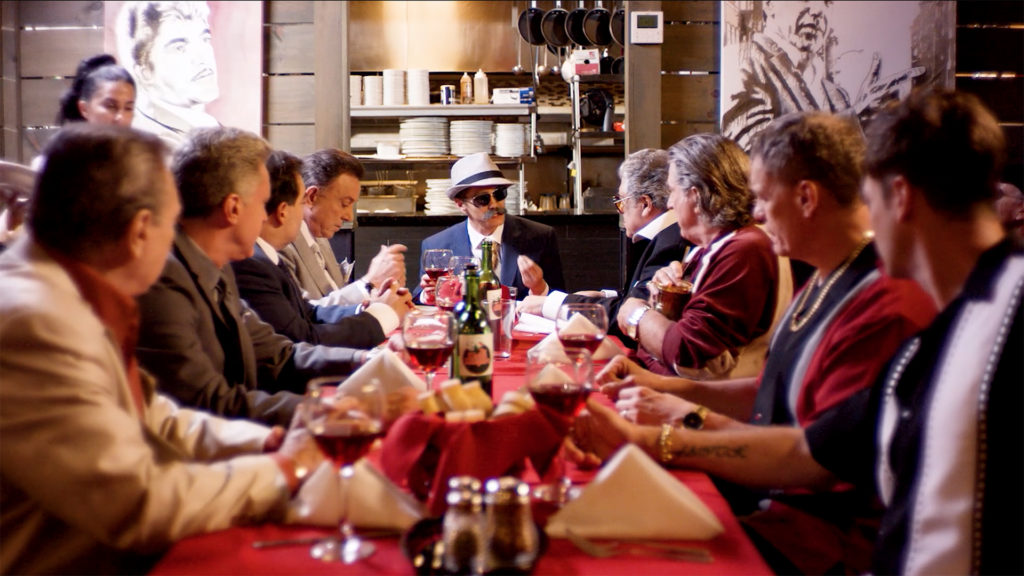
What’s crazier than sending your horse to audition for The Godfather, wackier than two parrots saying, “Are you talking to me?” in a Mexican pet shop that are on sale for two deniros and wilder than when after Oz’s Scarecrow introduced Toto to the Wizard by stating, “Say hello to my little friend,” he become Scar-crow? Jay Kwon starring as the wishful Wiseguy Vinny Chow who walks the fine Canal Street line between Chinatown Triads and Little Italy mobsters to win over an Italian bella donna in the insanely absurd, madcap comedy Made in Chinatown, which is served with PAPRIKA and PTSD.
Though the Triads and mobsters are at odds over noodles and pasta products, olive oil and spices, and Chow has hallucinations and feelings of not good enough, by PAPRIKA and PTSD I mean a Parody Amplified with Pseudo Racism, Inclusiveness and Kung fu Action by Pigeonholing Tropes with Stereotyping and Diversity.
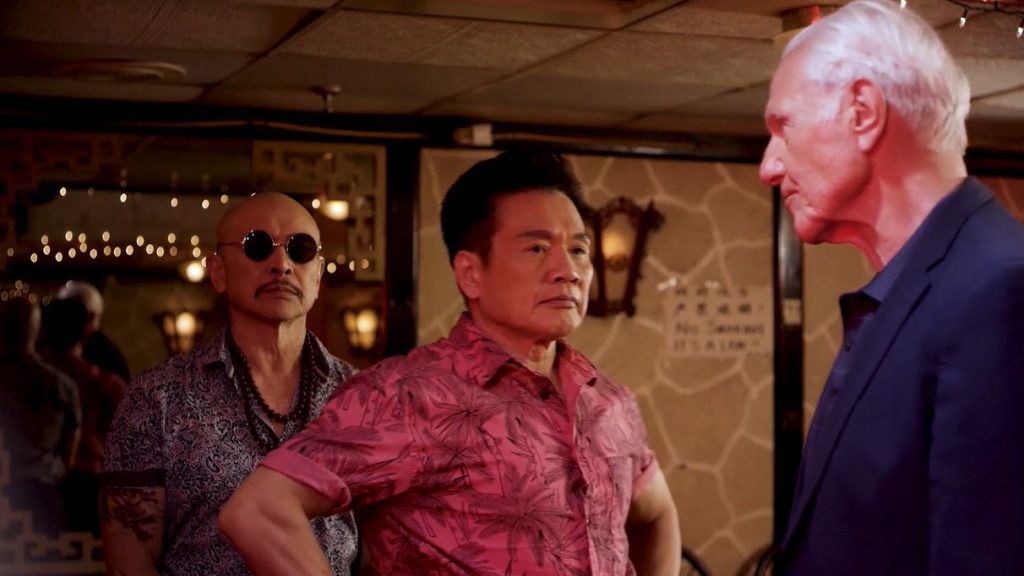
Directed by African American Robert Samuels, like any bizarre yet engaging satire, Made in Chinatown is smartly cheeky, perhaps wittily upsetting and prohibitively challenging for audiences. Many visuals and lines of dialogue are blatantly or wryly armed with backdoor humor, inside jokes and in your face puns that are all balanced or imbalanced by guilt, gaslighting or tossing your emotions under the bus.
As a wee lad, Samuels was thrown out of public school in third grade, Catholic school in fourth, and wasn’t allowed to attend any schools thus was sent to a military academy for the rest of his primary education. “At 10, my aunt took me to see Lo Lieh in Five Fingers of Death (1972),” Samuels joyously recalled. “At that moment, I knew I wanted to learn kung fu, do kung fu movies and work with all the Shaw Brothers guys.
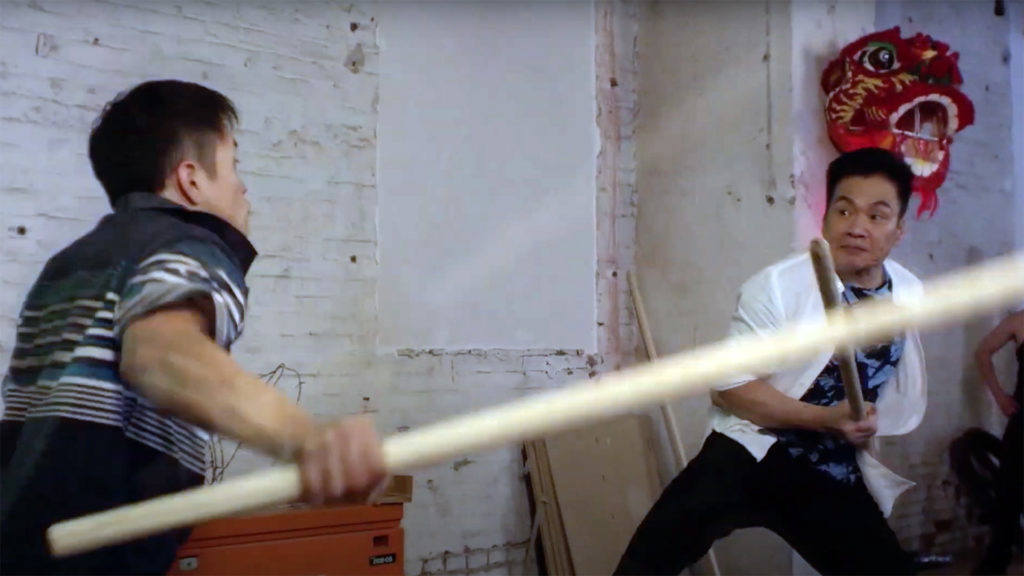
“I [soon] met Maurice Tunstall in Philadelphia and he said doing Bruce Lee imitations wasn’t real kung fu and offered to teach me Hung Gar (aka Hong Jia Chuen). As I started watching kung fu films, I realized I was doing kung fu, and have never stopped since.”
When Samuels came of age, he pursued his film passion by getting a job at USAir so he could fly back and forth to Hong Kong for free. The gamble paid off, he hooked up with Hung Gar specialist Chiu Chi Ling who became his manager and his first booked film was appropriately entitled, Gambling Ghost (1991) that starred Sammo Hung. He blurted, “A dream come true; Lo Lieh was in the film.”
Samuels then faced the biggest decision in his life. Finishing the film a week earlier, the producers owed him US $5000.00 yet wanted him to forfeit the money. Samuels insisted on talking to Sammo. “We weren’t close,” Samuel recalled. “Yet I told him I’d forfeit the money on one condition, I work with him again in the future. He said, ‘You’re willing to forfeit $5000 to work with me again?’ I said, ‘In a heart beat.’ He replied, ‘Deal.’”
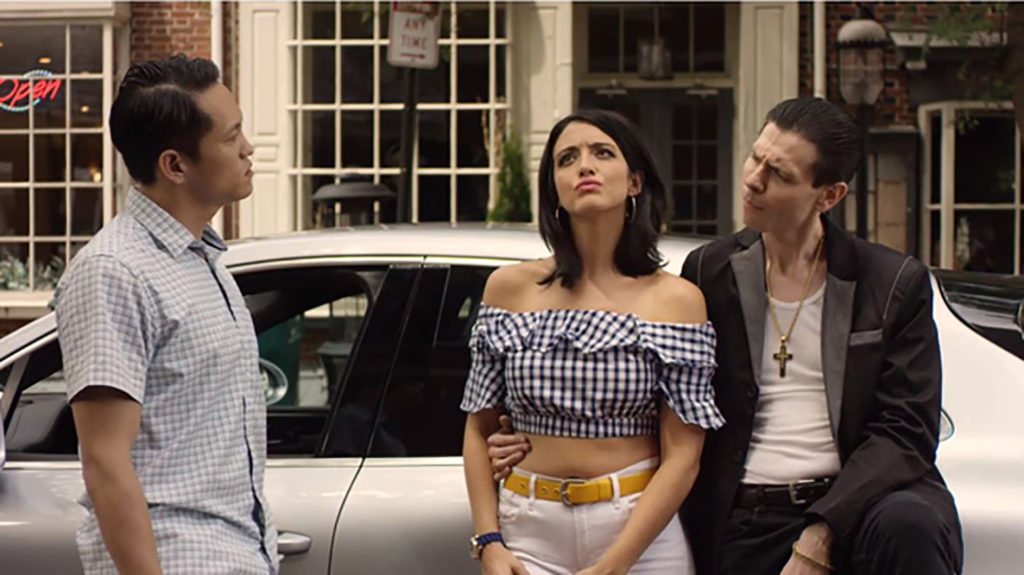
Samuels ended up living in Sammo’s house, met many Shaw Brothers stars who became mentors and Uncles, was the first African American inducted into Hong Kong’s Stuntman Association and received the first Jim Kelly Lifetime Achievement Award. Next adventure? Samuels’ full feature film directorial debut, Made in Chinatown.
Though shot in 2018, the film is being released during intense sociocultural times and a nationwide acknowledgement of hate crimes against Asian and Asian Americans. I was eager to ask Samuels if there were any reservation about directing a film that in some folks’ eyes may be perpetuating Asian American stereotypes and cinematic tropes?
Samuels said, “It was a balancing act and had to have jokes delivered in the way they’re supposed to. [Writer] Mark Wiley and I did script revamps in 2018. Since it plays on stereotypes, it’s a cautious tale, you have to walk carefully. We painstakingly detailed the humor, made sure they played on stereotypes and weren’t overt disrespectful comments.”
“America is currently in difficult times with ethnicities, BLM, hate crimes and turmoil experienced up to January sixth. The film is timely sensitive and has a more important meaning, it promotes unity and forces you to look at each other in a certain way and laugh. Nothing wrong with laughing, it’s what we’re lacking in America right now.”
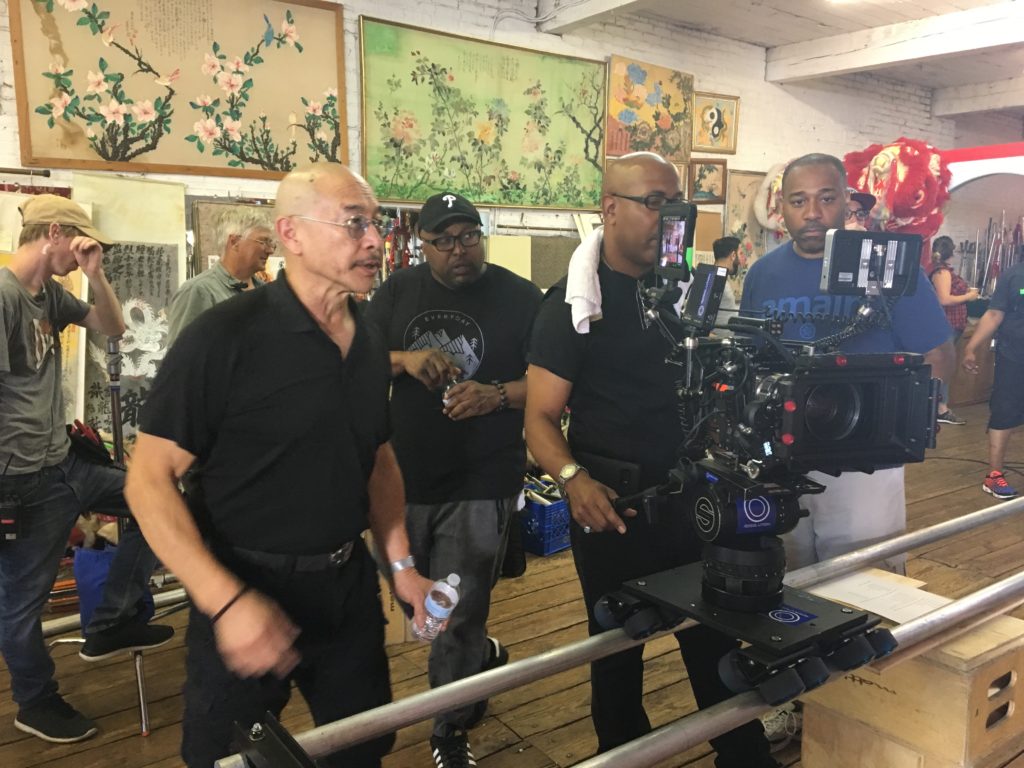
According to Samuels, at a sold out showing in Newark, New Jersey, they were concerned about what the feedback of the film would be with a sizable Asian turnout. “Forty Asians thanked me saying, ‘The film presented us how we’d like to be presented.’ We now knew we had achieved the right balance with the subject matter. It meant more to me than anything. They didn’t feel disrespected, got the jokes and the film treated the community with respect and dignity. We had a blessing from the Chinese community.”
As a grad student at National Taiwan University, have Chinese in-laws for now 40 years, writing about Asian Americans issues for decades and being a comedienne, the Chinese sociocultural issues and subtle narratives didn’t escape me. When I asked my wife if any parts of the film bothered her, she emphatically blurted, “No!”
When watching an actor, especially a newcomer like Kwon, there are three things I look for: he made me believe he’s going through what his character is physically, mentally, and emotionally going through, for Chow it’s an identity crises, which isn’t a stereotype; he does it with vulnerability; and he surprises me. Many martial arts actors don’t do that, because they’re hired to fight. Kwon sold me on all three fronts and he can fight.
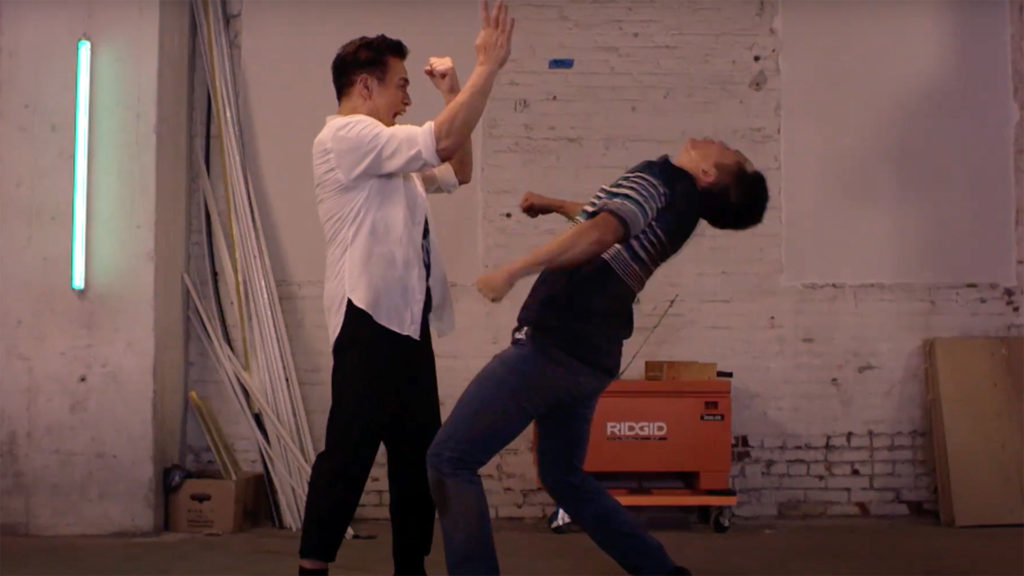
As a kid , Kwon was inspired to do martial arts after watching Robin Shou’s Mortal Kombat (1995). “I was like, I want to do that,” he said. “I began with taekwondo, then kickboxing, jiu jitsu, Filipino arts and Chinese kung fu. I liked Jackie Chan and Jet Li’s American films yet I wanted to do movies after researching their old kung fu films.
Kwon was attracted to Vinny Chow because he liked the challenge of playing an insecure character noting that he didn’t grow up around any Italians and thus watched The Godfather (1974) and similar films to prepare the accent. After I noted to Kwon his jaw line matched Brando and DiNero, he laughed, “It’s funny you bring that up. After I saw Godfather, I thought, ‘Oh, I do that already.’ When I played football in high school I made funny sounds, my teammates called it the bulldog because I did this growl (he does it). It was a perfect, I knew how to use the face. For the accent, I did it as I went along.”
”Growing up I had an identity crisis. My dad said I was an American Korean and I identified myself as more American with a partial Korean upbringing. Yet I love martial arts and found myself doing that. Taekwondo helped me find my heritage. As a whole martial arts taught me patience, dedication, work hard and to have an indomitable spirit.”
Besides Samuels and the film’s co-director, the Emmy Award fight director James Lew, Made in Chinatown’s other kung fu royalty including the perennial Shaw Brothers star Lo Meng, Kid with the Golden Arm (1979) and Five Deadly Venoms (1978) and the ubiquitous Chiu Ch Ling from Jackie Chan’s Snake in the Eagles Shadow (1978) and Kung Fu Hustle (1984).
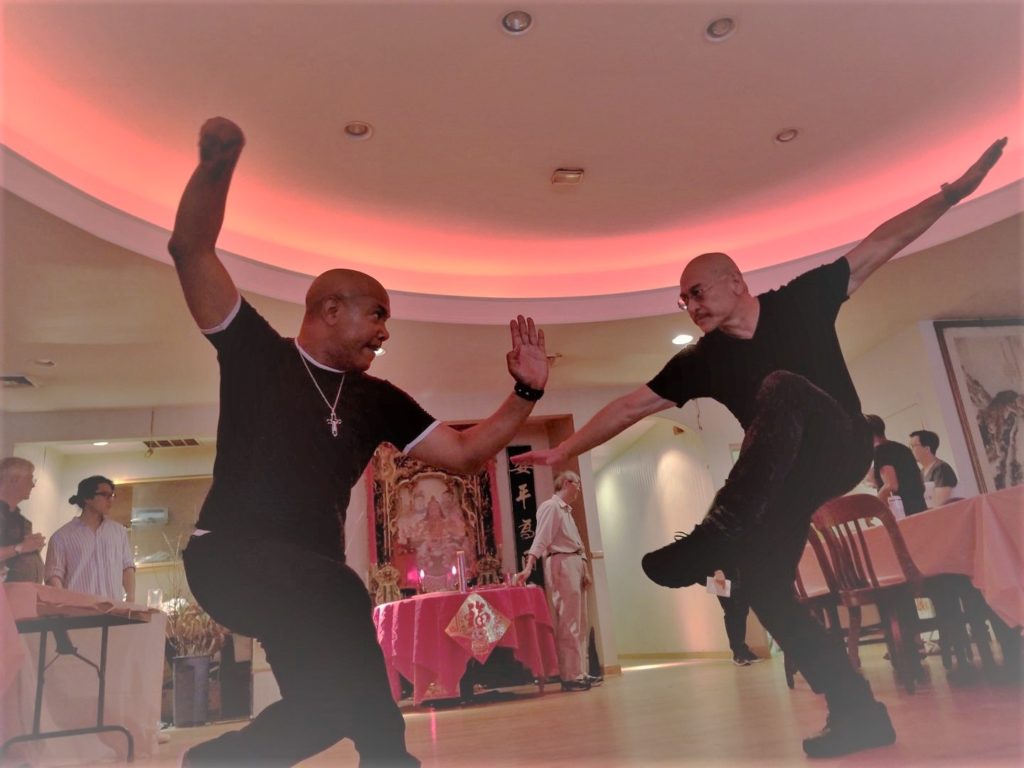
Lew’s choreography used a mix of Hong Kong stylism ranging from Chinese Connection (1972), some Shaw Brothers kung fu film camera angles that accents specialized skills with a helping of rapid-fire melees that were popular in Hong Kong in the 1980s, yet shot mostly with medium angles and with a one take, move on to the next shot mentality.
Though Kwon’s comedic timing was superb it was during the finale when he pulled an amazing rabbit out of his qua pi mao (male traditional Chinese hat) that blew me away. Everything was on the line for Chow, the one he loves, his sanctity, his cultural heritage and the anger of unfairness, all erupted within a single facial expression afore a Triad and mobster gauntlet. A face without fear, he was about to make them an offer they couldn’t diffuse. Ciao!